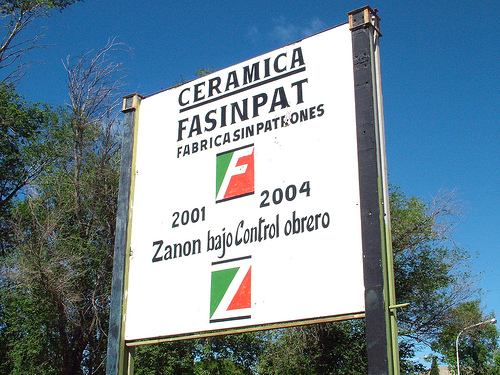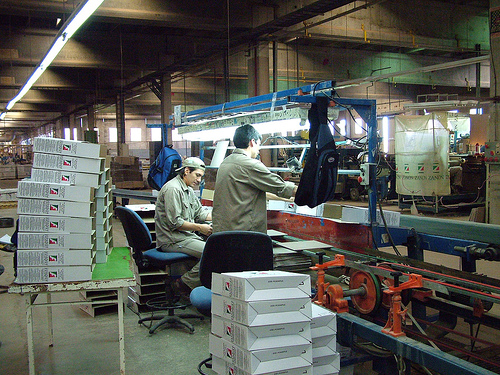I’ve been reading about FASINPAT, a worker-owned, democratically run ceramics factory in Argentina. From Marie Trigona:
The workers at Argentina’s occupied ceramics factory FASINPAT won a major victory this week, the factory now definitively belongs to the people in legal terms. The provincial legislature voted in favor of expropriating the ceramics factory and handing it over to the workers cooperative to manage legally and indefinitely. […] Hundreds of workers from the FASINPAT factory, factory without a boss, waited anxiously until the late hours of the night for the legislature’s decision. The expropriation law passed 26 votes in favor and 9 votes against the bill. […]
FASINPAT has operated under worker control since 2001 when Zanon’s owners decided to close its doors and fire the workers without paying months of back pay or severance pay. Leading up to the massive layoffs and plant’s closure, workers went on strike in 2000. The owner, Luis Zanon, with over 75 million dollars in debt to public and private creditors (including the World Bank for over 20 million dollars), fired en masse most of the workers and closed the factory in 2001-a bosses’ lockout. In October 2001, workers declared the plant under worker control. […] Since the occupation, the workers renamed the factory FASINPAT (Factory without a Boss).
The Wikipedia page about FASINPAT gives a nutshell history of the worker takeover. An earlier article, also by Trigona, provides more detail about how the factory runs. Trigona definitely writes as a booster, without attempting to be objective; still, I think it’s very interesting stuff. There’s far too much to quote, but here’s a sample.
At Zanon every worker is paid the same wage, with the exception of a small pay difference based on seniority, but seniority based on who withstood the old boss, firings, stand-off, and occupation.
The workers at Zanon have had the most political approach to hiring workers. Today, the plant employs 473 workers, more than 230 of whom were hired after the plant came under worker control. When Zanon began to produce under worker control they hired former Zanon workers who had been fired. Later they began to divide the job openings for grass roots activists working with the unemployed (piquetero) worker organizations.
Workers at Zanon have developed a coordinator system to organize production and basic functioning. Each production line forms a commission. Each commission votes on a coordinator that rotates regularly. The coordinator of the sector informs on issues, news, and conflicts within his or her sector to an assembly of coordinators. The coordinator then reports back to his or her commission news from other sectors. The workers hold weekly assemblies per shift. The factory also holds a general assembly, during which production is halted, each month.
Every month the bookkeeping coordinator gives an extensive report on the income and expenditures at the plant. During the assemblies workers decide how profits should be used. One month, the assembly voted on a pay bonus for workers as the production quota goal for June, 2006 went above expectations. Workers also voted in favor of hiring 15 new workers. Who will get the job is decided on criteria based on family needs, political commitment to the struggle, and technical experience. One participant also brought up the possibility of workers rotating to explore other areas of worker management.
While the factory has adapted democratic practices, many workers have found that smaller meetings have been more effective for workers to address specific concerns or volunteer ideas.
Gender Relations
Women at Zanon created a Women’s Commission (Comision de Mujeres de Zanon ) in 2004 after a national congress on gender and equality in the Coastal city of Mar del Plata. They have begun to print a newsletter, which is distributed to all 470 workers. […] One issue the workers’ assembly has still to resolve is the need for day care for children, not only for mothers but the majority of workers who are fathers as well. The Women’s Commission has organized specific activities like giving away decorative ceramic calendars in the city center, meeting with other women from social movements, and coordinating activities like a talk on domestic violence in the factory for November 25: International Day for the Elimination of Violence against Women.
Re-learning Production
Under worker control, no management or professional stayed at the factory. The workers not only had to re-learn the process of production but also other traditionally administrative areas like sales, book keeping, and production planning. Workers at Zanon regularly work with lawyers, accountants, and other professionals whom they trust, but the professionals don’t make decisions. The worker assembly votes on technical decisions. Professionals have provided specific skills training for workers at Zanon. However, for many of the recuperated enterprises there is a deficit of trustworthy professionals.
FASINPAT doesn’t stand alone; it’s part of a Latin American movement for worker-owned, “bossless” factories that has been going on for nearly a decade.
De Geografías e Historias quotes an article about FASINPAT, which can be read in English here via Google’s translator.






Ah, looter crony capitalists robbed by looter communists…you have to love it. And here I thought this was just a rather silly chapter in a rather silly Ayn Rand book…
FASINPAT has operated under worker control since 2001 when Zanon’s owners decided to close its doors and fire the workers without paying months of back pay or severance pay.
I’m no fan of expropriation of private property. But if they owed the workers to this extent and the factory itself was a) the only asset available and b) had a worth comparable to what was owed (facts not in evidence, but I’ll posit them), then this seems equitable.
How it’s being run is another matter. Political viewpoints are employment qualifications? Yow!
Under worker control, no management or professional stayed at the factory. The workers not only had to re-learn the process of production but also other traditionally administrative areas like sales, book keeping, and production planning. Workers at Zanon regularly work with lawyers, accountants, and other professionals whom they trust, but the professionals don’t make decisions.
So they hire professionals as contractors. Not a bad idea, actually. As long as they make sure that there’s some skills transfers. Not letting the lawyers and accountants run things is something I’ve long advocated for American companies.
Are there any outside concessions given to this factory? Are they favored for government contracts, exempt from certain regulations, etc., etc.? What’s the competing environment for ceramic tile manufacture in the market they sell to?
Ron, until a few years ago, the government was trying to shut them down; there were many confrontations with police over the years. It therefore seems unlikely they’ve been given special exemptions or contracts; but of course I can’t say for sure.
The ceramic tile market is mostly an export market, and this factory mostly made tiles for export before the takeover. According to the articles, since the takeover, they’ve concentrated on building a domestic market. They also offer a discount to local residents who come to the factory in person to buy tiles (which presumably saves them money by cutting out distributors).
Without being able to speak to the specifics of this factory, I wanted to note that the relationship between organized labor and the Peronist party that controls Argentina now and has controlled it for most of the last 50? 60? years is very, very complicated. Like the PRI in Mexico, it’s very hard to categorize the Peronists as “left” or “right.” They are (ironically?) statist, populist parties interested in maintaining power and employing extensive patronage systems as the carrot (and state-sanctioned violence as the stick) to do so. They tend to support unions that answer to them, that they control, for the purpose of mobilizing political supporters and giving out jobs as reward for voting the right way (or beating up the right people) and oppose unions (and other types of worker organizations) that are independent of their control and that answer to their membership, not party leaders.
A lot of the factory owners and other better-off segments of Argentine society that bit the dust (so to speak) during the economic crisis were very connected to the government – that’s why they were well off – and it’s not surprising at all that even a supposedly “leftist” (leftist, as far as I can tell, only because they’re a bit testy about cooperating with the IMF) governments that Argentina has had since the crisis wouldn’t get along swimmingly with the workers in this worker-owned factory.
As for hiring based on political views, well, I’m sure that never, ever happens in factories controlled by bosses.
Well, good for them – I hope they develop that market and make a good living doing it. I have no problem with the concept of an employee-owned enterprise. They’re still going to have to make money to survive. If they can do it and develop the management expertise internally and contract for the outside expertise they need more power to them.
Here is a film worth seeing for those who aren’t familiar. It’s polemical. I definitely recommend the extra where Avi Lewis states that the reason the interview with the IMF guy isn’t in the film is that it was boring — but what is in the film is the guy refusing to talk to them because they ambushed him at his hotel. But the film is an easy way to get something of the workers’ perspective. (The website also has more.) Not only did the factories exploit the workers without paying them, but the owners got lots of money in government bailouts. It could be argued that the broader society bought the factories.
It does, and it’s wrong.
Yeah. That was sarcasm. And I agree that it’s wrong, but given that it occasionally happens under both types of ownership, it’s not a huge strike against worker-owned factories.
No, not a huge strike, but I think the key difference is the bosses quietly used the practice to entrench the status quo what they’re doing codifies it. I see it as a way to add power to the good old boy network, not everyone lives in a place where there are a lot of career options, if agreeing with the politics of the people that already work there is a pre-req for the job outsiders (in any sense of the word) will have a problem. If the usual small town politics are at play this just gets worse since the friends and relations of the politically powerful are the most likely to get hired.
Now, the boss’s college roommate’s kid is also ensured a job, but there’s (some) stigma to that and i’d like to see that strengthened not weakened. The more meritocratic the better in my opinion.
But in this case it’s a pretty small compliant. Especially in a society that already has a lot of patronage.
Nice blog! Interesting comments. I generally don’t intend to be objective, I embrace working class-subjectivity, and try to tell stories that are under represented. Again, cool blog!